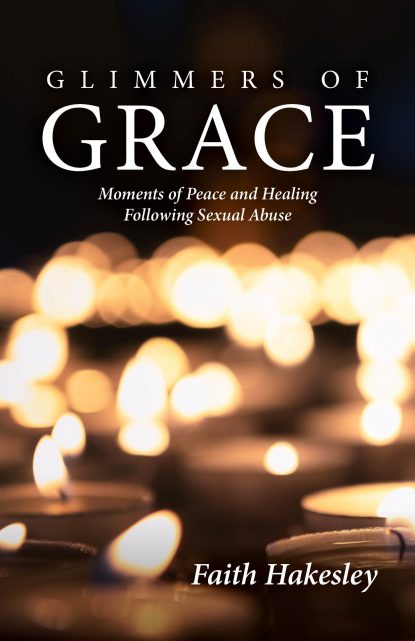
This is the cover of the book “Glimmers of Grace: Moments of Peace and Healing Following Sexual Abuse,” by Faith Hakesley. The book is reviewed by Agostino Bono. (CNS photo/courtesy Our Sunday Visitor)
“Glimmers of Grace: Moments of Peace and Healing Following Sexual Abuse” by Faith Hakesley. Our Sunday Visitor. (Huntington, Indiana, 2020). 174 pp. $15.95.
Reams have been written about the legal and moral dimensions of the clergy sexual abuse of minors and its decadeslong cover-up by Catholic officials, stretching into the papacy.
Not grabbing as much attention but equally important is the long-term destructive effects on the lives of abuse victims.
The damage to victims’ souls, emotions, psychological well-being and physical health has been devastating. Some commit suicide. Others become predators themselves. Many cannot have healthy, normal emotional relationships with other people and even distrust people honestly trying to befriend them.
Countless numbers lose their faith, not understanding how a loving God could allow sexual abuse by someone who represents him.
The road to peace and healing is a difficult one. Not all make it. And those who do are forever haunted by the trauma. This explains why victims prefer to call themselves survivors. Every day is another survival.
“Glimmers of Grace” is an effort to provide some simple, practical guidance to climbing the spiritual ladder back to God. Who better to write it than a survivor of clergy sex abuse? The author, Faith Hakesley, began working on Saturdays in her parish rectory when she was 15 and soon was repeatedly raped by the parish priest.
She quickly notes that her guidance is a supplement to — not a substitute for — professional psychotherapy and spiritual counseling. Hakesley has undergone both and calls them invaluable. To build on professional help she suggests traditional spiritual practices such as saying the rosary and praying in church before the Blessed Sacrament. Her selection of uplifting quotes range from Mother Angelica to St. Augustine.
[hotblock]
To these she adds accepting “glimmers of grace,” defined as God’s little miracles, such as a gentle breeze brushing across the face, to show his comforting love. For her the glimmer of grace was a Tootsie roll handed to her by a guard as he ushered her into the courtroom to testify against the priest.
Whether the book helps survivors depends more on the disposition of the survivor than on the author’s sincere desire to let her experiences aid others.
The book, however, also is important for those who have not been victims. Woven into the narrative are her personal traumas and the long-term destruction the abuse caused. Understanding these is crucial to realizing that the damage done by clergy sex abuse does not end with a guilty conviction or a multimillion-dollar court settlement. Survivors still have to continue surviving afterward.
Hakesley bares her soul and heart as she tells how she initially was overcome with feelings of guilt, shame and self-blame, accusing God for allowing this to happen. As her personality changes, the author wonders what happened to that girl who loved to plant sunflower seeds and watch them grow.
Regarding faith, she writes:
— “I felt nothing when I received Jesus in the sacraments.”
— “I fought my parents about going to church after my rape and resented them for making me go.”
The author attributes loving, supportive parents and later a loving, caring husband for helping her regain a stable life and restore her faith. But many survivors don’t.
***
Bono, a retired CNS staff writer, interviewed many survivors for CNS stories.
PREVIOUS: ‘The Dig’ unearths deeds of ancient man, and present men
NEXT: Parents get advice on helping ‘screenagers’ navigate social media


Share this story